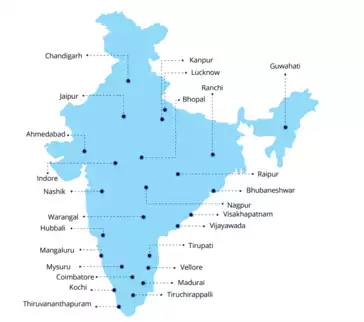
India’s tech industry is undergoing a significant decentralization shift, as outlined in a recent report jointly published by Deloitte and Nasscom. This transformation entails a move away from the seven major IT hubs—Delhi, Mumbai, Kolkata, Chennai, Bengaluru, Hyderabad, and Pune.
Traditionally, the majority of the 5.4 million tech industry employees in India have concentrated in these seven cities, according to the 220-page report titled “Emerging Technology Hubs of India.” Sumeet Salwan, a Partner at Deloitte India, observed, “While big cities were the focal point in the past, the post-pandemic era has witnessed a remarkable dispersion of work across the nation.”
Sukanya Roy, Head of GCC and BPM at Nasscom, noted that as global companies continue to reassess their working methods to optimize outcomes, costs, and talent, the development of alternative tech hubs in India is becoming increasingly essential. “India is projected to have a surplus of skilled talent by 2030. These hubs offer companies a compelling blend of advantages: access to a fresh, skilled talent pool, cost-effective operations, and robust infrastructure,” Roy stated.
The Report identified 26 tier-2 and tier-3 cities across India that are attracting IT companies. These cities include Chandigarh, Nagpur, Ahmedabad, Mangaluru, Kanpur, Thiruvananthapuram, Lucknow, Guwahati, Ranchi, Bhopal, Jaipur, Indore, Nashik, Bhubaneshwar, Raipur, Nashik, Nagpur, Warangal, Visakhapatnam, Hubbali, Vijayawada, Tirupati, Mysuru, Coimbatore, Vellore, Madurai, Tiruchirappalli, Kochi, and Vellore.
The decentralization trend is driven by several factors. The report noted that about 11-15 percent of tech talent is based in tier-2 and tier-3 cities, with approximately 60 percent of graduates in key fields originating from smaller cities. Of these graduates, 30 percent typically relocate to tier-1 cities for employment. The emerging cities are witnessing a surge in digitally skilled professionals, with over 100,000 contributing to their growth.
These emerging hubs offer businesses a 25-30 percent cost advantage in terms of talent pool costs and a striking 50 percent lower real estate rental compared to mature hubs, according to the report. Companies like Infosys, Wipro, HCLTech, and WNS have already established operations in one or more cities within these emerging hubs.
Regarding the startup ecosystem, the report highlights that by 2022, over 7,000 startups were operating from these emerging hubs, covering a wide range of fields from DeepTech to BPM services. These startups grew by 50 percent from 2014 to 2018 and are projected to expand 2.2 times by 2025. Notably, 13 percent of the funding in 2022 went to startups based in tier 2 cities in India, indicating that investors are increasingly looking beyond urban settings for potential unicorns.




